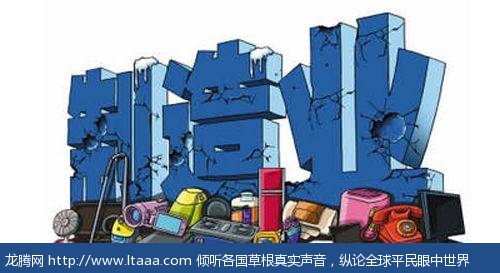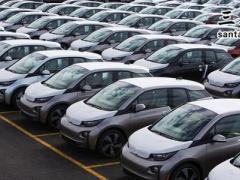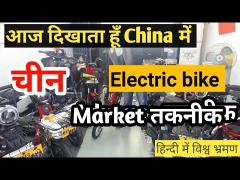最新印度讨论:为什么印度没有成为一个制造业强国? 印度能从中国学到什么? [印度媒体]
印度网友:这很大的责任都于印度公司的出口服务。 我们进口超过60%的商品,造成的赤字要远远大于出口的服务。事实上,出口服务只是增强了卢比兑美元汇率。 另一方面,中国的货币被低估了,其便宜的劳动力,电力,快速运输和良好的基础设施辅助制造业。 另一方面,印度仍然处于如对付例如像Mamota didi政治家的阶段!!!!!!
Why isn't India a manufacturing powerhouse? What can India learn from China?
为什么印度没有成为一个制造业强国? 印度能从中国学到什么?
Anup Mohan, Indian, Working in China for over 1.5 Years
I have been working in China for over a year now and there are many observations that I have made. I will divide it in few categories for you to get a better understanding.
我已经在中国工作了一年多,并做了很多观察。我把它分成一下几个几点,以便大家更好地了解。
1.Economic Development
1.经济发展
a.Roads and Highways - China has the world’s largest network of Expressways. They have been planned and were constructed as 6–8 laned from the beginning itself. Also, one of the things I love about highways in China is that most of the times they are vertical as in they are constructed as long bridges, in Indian term just like a super long flyover. It is extremely smart since it doesn't require land acquisition (A major problem in India) and still fulfills the purpose and doesn't create a problem with the land owner.
a.公路 - 中国拥有世界上最大的高速公路网。公路被规划好并且从一开始的建造就是按6-8车道的标准。另外,我喜欢中国高速公路的事情之一是,在大多数时候,它们是垂直建设的,公路被建造成长桥,如果按照印度的标准,中国公路就像一个超长的天桥。这是非常聪明的,因为它不需要征地(印度的一个主要问题),而且符合目的,不会造成占地的问题。
b.Housing - One thing I absolutely love about China is its strong will to accommodate every single person in it. No matter which city I go to, big or small, metro or normal, I always find super tall apartment buildings that are as high as 40–50 floors. Again, as in highways, going vertical than horizontal (As in India). These are luxurious apartment for rich class as well as lower income apartments. Accommodating the world’s most powerful middle class is a daunting task in itself.
b.公寓- 我喜欢中国绝对的一件事是因为它能够满足每个人的强大意愿。无论我去哪个城市,无论大小,有地铁或没有,我总是能找到高达40-50层的超高层公寓。再次,在高速公路上,都是竖起来建设的(在印度都是平的)。这些豪华的公寓不仅提供给富裕阶层也提供给低收入阶层。适应世界上最强大的中产阶级的需求本身就是艰巨的任务。
c.Bullet Trains - Imagine this, in 2008 China didn't have High Speed Trains where as in 2012, it had the longest network of High Speed Trains in the world. Such magnanimous construction of bullet trains on a national level has never been thought of attempting than in China. These trains don't just carry people but has become an economic backbone of China. And yes, the train stations are giganticly massive and even the ones in some small cities are better than many Tier 2 cities’ airports in India including Delhi Domestic Airport (T1D).
c.子弹头火车 - 想象一下,在2008年中国还没有高速火车,但到了2012年,它拥有世界上最长的高速火车网。这样庞大的子弹头列车建设从未被认为能在中国实行。这些火车不仅仅是能载人,而且已经成为中国的经济脊梁骨。火车站是无比巨大的,甚至在一些小城市,也比印度的许多二线城市的机场还要好包括德里国内机场(T1D)。
d.Overall infrastructural development - If there is one reason of why China is, what it is today, the building block of that in Infrastructure. Once I went to Ningbo, a city famous of universities and about 3 hours away from Shanghai. It is not a metro city as such and not that famous/big too. But I was shocked while walking on the road with 16 lane highways and 20–30 floor buildings in each side. The view and architecture and the infrastructure of such a small city is incomparable with our Delhi and Mumbai. The amount of planning and money that have gone into it is evident by looking at it for a second.
d.全面的基础设施建设 - 如果有一个原因为什么是中国,为什么是今天,那就是基础设施建设。一次我去了宁波,去一所着名的大学,距离上海约3个小时。宁波不是一个地铁城市,也不是那些有名的大城市。但是在路上行走时,我感到非常震惊,每条高速公路有16条车道和车道两边的20-30层高楼。这样一个小城市的景观,建筑和基础设施是德里和孟买是无法比拟的。通过观察一秒钟你就可以得出这需要海量的计划和金钱。
2.Living and Lifetsyle
生活与生活方式
a.No Cash - One of the things I absolutely love about China is that if I don't have cash, I don't need to worry about anything. Imagine, if you could pay at a super market through whatsapp? That's what wechat does to you. BTW, I always say there are 2 gods in China. One is wechat (Chinese version of whatsapp) and second is Taobao (read more about it in the next point). I don't carry cash and always use wechat pay in taxis, super markets, cafes and so on.
a.无现金生活 - 我超级喜欢中国的事情之一是,如果我没有现金,我不需要担心任何事情。想像一下,如果您可以通过whatsapp在超级市场上付款?对,这是wechat对你做的。 顺便说一下,我总是说中国有两位神。一个是wechat(中文版的whatsapp),第二个是淘宝,我已经习惯了不携带现金,总是在出租车,超级市场,咖啡馆等地用微信付款。
b.E-Commerce - China already has the biggest E-Commerce market on the planet. As I was talking about the 2nd God of China I.e. taobao, an online shopping website much like ebay, owned by Alibaba sells everything from a wife (YES!) to airplanes and even trains. In order to boost e-commerce, alibaba is investing into rural internet sector. People love to shop online in China and many of them wait for hours because there will be a sale post that wait.
b。电子商务 - 中国已经在全球拥有最大的电子商务市场。正如我在谈论中国的第二神。淘宝网,一个非常像ebay的在线购物网站,由阿里巴巴拥有,从老婆(YES!)到飞机,甚至火车都卖。为了推动电子商务,阿里巴巴正在投资农村网络。人们喜欢在中国网上购物,其中许多人等待几个小时,因为会有秒杀机会。
c.Health and Healthy - When I was working in India, I was considered a fit person. The moment I moved to China, I was the fattest person on my team. Chinese people have the highest standards possible for fitness and being healthy. There were many instances during my experience here when I would eat something sweet (say putting sugar in coffee or an ice-cream) and the people around me would make fun of me saying, this is not healthy and will make you have diabetes, etc. Their food is also made in such a way that it's healthy. No wonder I have lost 18 KGs in 1 years (from 88 to 70).
c。健康与健康生活 - 当我在印度工作时,我被认为是一个标准体重的人。当我搬到中国的那一刻,我是我们队中最胖的人。中国人拥有健康最高标准。在我待在这里的经历中,有很多情况下,我会吃点甜点(比如把糖放在咖啡或冰淇淋里),周围的人让我关心的说,这不健康,会让你有糖尿病等,中国人的食物也是以健康的方式制作的。难怪我在一年内甩了18公斤的膘(从88到70)。
d.Governed Internet - As much as people don't like to see it this way. As its famously known, Chinese Internet has firewall restrictions that doesn't allow people to use global internet content and has even banned websites like Google, Facebook, etc. I have always thought that having restricted Internet is better than having free internet due to many reasons as follows -
d.监管的互联网 - 尽管可能很多人不喜欢看到这样的内容。众所周知,中国互联网具有防火墙限制,不允许人们使用全球互联网,甚至禁止像Google,Facebook等网站。我一直认为,监管互联网比得到免费的互联网要好的多,原因如下 -
i.Terrorism - You will be shocked to know this but there was a team when no one on my team knew about ISIS, at a time when it was all over the media because internet was governed and everything related to it was blocked by the government. It's a complete solution to all the problems that many countries face today.
i.恐怖主义 - 你会惊讶地知道这一点,当我的团队中没有人知道ISIS的时候,在媒体上,因为互联网被管制,与之相关的一切恐怖信息都被政府所封锁。这是许多国家今天面临的所有问题的完美的解决方案。
ii.Local Version Creation - Yes, since global websites don't work that gives the economy a chance to create a local accustomed version. This in turn boosts job creation.
ii。本地互联网版本创建 - 是的,因为全球网站不能在中国工作,这给了中国人有机会创建本地习惯的互联网版本。这反过来又增加了创造就业机会。
iii.Helps maintain positivity in people - Many a times, as an Indian I read articles and blogs about Indians hate India. About how everything is just not right and then a blame game begins. Another way of dealing with it is how Chinese do it, have a problem and then invite solutions from people, hire them and let them take it further.
iii。帮助人们保持积极性 - 很多时候,作为印度人,我读了很多关于印度人的文章和博客都是说印度人恨印度。关于一切如何不正确,然后导致一个奇怪的游戏开始。处理这个问题的另一个办法是看中国人怎么做,有问题,然后邀请人们解决问题,聘请他们,让进一步去处理。
e.Food Timings - Breakfast Around 9. Lunch at 12–1. Dinner at 5–6. The best. No one eats anything after dinner as it's considered unhealthy. Everyone respects this time. It gives enough time to digest food and not like India where we eat and then sleep without any time for digesting food.
e.吃饭时间 - 早餐约9点,中餐12-1点。晚餐5-6点。这是最好的。晚餐后没有人吃任何东西,因为它被认为是不健康的。每个人都尊重这一次。这给了胃足够的时间消化食物,而不是像我们在印度,吃完后就睡觉,没有任何时间消化食物。
3.People and their Characteritics
人民和他们的个性
a.Installation of ‘being proud’ of my history - Chinese are taught to be proud of their history. They often consider their history as the oldest , which factually is wrong. But it's a famous saying in China that you are experiencing 5000 years of history and 30 years of continuous economic development, in China. The percentage of Chinese people knowing the names of each emperor who has ever ruled China will be atleast 50% more than India. When I was in the class 10th, I learnt French Revolution and more about international history but Chinese learn about themselves first.
a。建立为自己历史的自豪感- 中国人被教导为自己的历史感到自豪。他们经常认为他们的历史是最古老的,事实上是错误的。但在中国,这是一个有名的言论,在中国经历5000年的历史和30年的持续经济发展。中国人知道每个曾经统治中国的皇帝的名字,这个比例比印度高出50%。当我上第十课时,我学习了法国大革命,更多地了解国际史,但中国人首先了解自己。
b.Efficiency of People and Commitment - I often say this. If an Indian takes 10 hours to accomplish a task, the same can be done in 3 hours by a Chinese. We, Indians, have had a lazy atmosphere to grow in. For example, need a tea every couple of hours for which we will take a break, and so on and so forth. You will be shocked to know that generally there are no work timings in China as they are in India. It always workS according to the tasks, if you finish early, leave early, if you finish late, leave later. Not like India, where you constantly keep looking at the watch, waiting for the time to end.
b。有效率的人民和信守承诺 - 我经常这样说。如果印度人需要10个小时才能完成任务,中国人可以在3小时内完成任务。我们印度人有一种增长的懒惰氛围,例如,每几个小时就需要喝茶休息,等等。你会很惊讶地知道,中国一般没有工作时间,不像印度。中国人总是按照任务工作,如果你早点完成,就早点离开,如果你做不完,就推迟再离开。不像印度,你经常要看着手表,等着下班。
c.Neutral Sentiments about India - You will be shocked to know this. Many times I asked people of what do they think of India. And most of the replies I get are ‘Growing Economy’, ‘Buddhism’. Now, when I ask the same question in India, people say ‘enemy’ ‘unreliable’, etc. Sometimes I even asked them if they know about the current ongoing border disputes between India and China, or even about 1962 war. Shockingly, they don't.
c。关于对印度的中性情绪 - 你会惊讶地知道这一点。很多时候,当我问人们他们对印度的看法。我得到的大部分答复是“经济成长”,“佛教”。但是,如果我在印度问同一个问题时,印度人们会说“敌人”是不可靠的“等等。有时甚至问他们是否知道当前正在进行的印度与中国之间的边界争端,甚至是1962年的战争。令人震惊的是,中国人都不知道。
4.Government and Administration
4. 政府和行政管理
a.Effective Management - I will give you an example. Many times, I see some people who keep walking on the street with a picker and a box. They keep collecting the leaves dropped on the road for the trees above. They keep doing that throughout the day. Obviously, they work in the municipal department. Another example, I have been to 18 countries but I haven't seen a city as green as Beijing. It's remarkably true. Another example, the pollution system in Beijing. It's divided in 5 levels and the most extreme levels have implications that shut factories down and even declare a holiday. The fact is, that everyone follows it.
a。有效管理 - 我会给你一个例子。很多时候,我看到有些人在街上走着,一边拿着一个扫帚和簸箕。他们不断收集落在路上的树叶,上面的树枝。他们一整天都在这样做。显然,他们在为市政部门工作。另一个例子,我去过18个国家,但我还没有看到像北京一样绿色的城市。这是非常真实的,又如,北京的污染体系分为5个层次,最极端的层面是有关闭工厂关闭甚至宣布假期。事实是,每个人都遵循它。
b.Upliftment of all sections - China has the world’s biggest middle class. Below that, even the lower class which lacks education, skills and lives in villages get employment opportunities like if there is a cloth manufacturing factory in the vicinity or the nearest city then the people in the village will be taught on how they can contribute to it in the easiest ways possible. So in such a case, they are taught ironing and then ultimately become employed. China has engaged everyone and every class of the society with its economic miracle.
b。阶级的转换 - 中国是世界上最大的中产阶级。在此之下,即使是缺少教育和技能,生活在村庄的下层阶级也提供就业机会,如在附近或最近的城市有制衣厂,就会教会村里的人们如何在最简单的方式下做可能的贡献。所以在这种情况下,人们被教育,然后最终被雇用。中国已经实现了个人和社会各阶层的经济奇迹。
5.Business Environment
5.商业环境
a.Start up Environment - China has the highest number of start up incubators, VCs, Angel Investors in the world. Many of the incubators are managed by the government. The government is actively involved with it and the youth is increasingly getting diverted towards entrepreneurialism, much higher than India. Eg. All Chinese phone companies in India are start ups except few.
a.启动环境 - 中国在世界上首先建立了企业创业孵化器,风投,天使投资者人数最多。许多孵化器由政府管理。政府积极参与,青年越来越多地转向创业主义,这远高于印度。例如。印度的所有中国电话公司都是初创企业,除了少数。
b.Indigenousization - As explained earlier, when everything has a local version, it creates more employment opportunities for the economy and promotes innovation as people try to make it better and align it with local customs and tradition. For a country like India, it can generate a lot of employment. For example, Tata Indica (the first indigenous car made in India) had involved and engaged more people than any other car, primarily because others were simply made and sent to India where Indica was thoroughly researched project involving knocked down details of each aspect.
b。本土化 - 如前所述,当一切都有本地版本的时候,它会为经济创造更多的就业机会,并促进创新,因为人们试图使之更好地与当地的习俗和传统保持一致。对于像印度这样的国家,它可以产生大量的就业机会。例如,塔塔印度(Tata Indica)(印度制造的第一辆本土汽车)聘用了比任何其他汽车公司更多的印度人,主要是因为其他公司只是把半成品发往印度并简单地制造,所以印度被彻底排除研究的项目涉及到每个方面的细节之外。
c.Innovation- Chinese invest a lot of resources into Innovation. For eg, the problem with ever increasing screen sizes of smart phones was their batteries. Chinese came up with the concept of a power bank. Today, you will not find even a single power bank not made in China. Indians on the other side focus more on accomplishment than challenging the paradigms to innovate.
c。创新 - 中国投入大量资源进行创新。例如,智能手机屏幕尺寸不断变大导致电池续航问题。中国人想出了一个充电宝的概念。今天你甚至不会找到一个没有在中国制造的充电宝。另一方面,印度人更注重成就,而不是挑战创新的范式。
d.SEZs- Shenzhen, One of the biggest SEZs in China is a role model for SEZ in the world. Every electronic product which is made in China will be made in Shenzhen, from a Samsung LED TV to a fake charging wire. And yes, everything is exported to all over the world through Hong Kong (A global financial hub) from Shenzhen. What a combination to learn from!
深圳是中国最大的经济特区之一,是世界经济特区的榜样。在中国制造的每一种电子产品都是在深圳制造,从三星LED电视到假充电线。是的,一切都通过深圳的香港(全球金融中心)出口到世界各地。我们应该从里面的结合中学到什么?
6.Education System
6.教育制度
a.Live in Dormitories - One thing I absolutely love about Chinese education system is that it is mandatory for you to live in a dormitory while studying in the university. I have grown up in Delhi, living with my parents where everything was given to me in a plate. In India, A lot of of cities have ‘colleges’ where you go in the morning and come back in the afternoon/evening. This teaches us education but not life, a very essential part of university education is missed out on. Compare that with Chinese, who would have to live in a university outside his/her parents cocoon where he/she would not just learn studies but also about how to live among others, how to live by yourself, how to manage your finances, etc etc. Since it is mandated in China, a Chinese graduate would score much higher than an Indian in terms of life’s education over university education.
a.住在宿舍里 - 我超级喜欢中国教育制度的一件事是,在大学读书时,你必须住在宿舍。我在德里长大,和我父母住在一起。在印度,很多城市早上都有上“大学”,下午/晚上回来。这教导我们只是接受教育而不是生活,大学教育的另一个非常重要的部分被忽略了。与印度人相比,中国学生必须住在他/她的父母保护之外的一所大学,他/她不会只学习学习,而且还有如何生活在别人之间,如何自己生活,如何管理你的财务等,中国毕业生在中国的任职期间,在大学教育方面的生活教育比印度人高得多。
b.Army Training - Army training is mandated in all state and federal universities in China. This is where they are taught to be proud of their history, of their legacy. Also, this training consists of Living in a forest for a week or 2 to live in an army lifestyle. By going through such an experience, a young person automatically becomes supportive of the army by looking at the everyday challenges they go through to protect their country. Imagine this in Chhattisgarh, for fighting Marxists? Or even Kashmir? I have met many Chinese people outside China and history always remains in their veins.
b.军训 - 军训是在中国所有州立和联邦大学授权的。这是他们被教导为他们的历史和遗产感到自豪的地方。此外,培训包括在一个森林里生活一个星期,或者2个星期,经历生活在一个军队的生活方式。通过这样的经历,一个年轻人通过观察他们通过的日常挑战来保护自己的国家,自动成为对军队的支持。想象一下这个在Chhattisgarh,为了战斗的马克思主义者?甚至克什米尔?我遇到了在中国以外的很多中国人,历史依然存在于他们的血脉中。
These were many experiences that I could think of. There are many more on the back of my mind.
In the end, China has a lot to learn from India And India has a lot to learn from China. The question is, how much are they willing to accept each other in order to learn from each other? Think about it.
这些是我想到的许多经验。在我脑海里还有更多的东西。
最后,中国有很多可以从印度学习的东西, 印度也有很多从中国学习的东西。问题是,中国和印度是否愿意相互接受并能相互学习?好好想想吧。
Keertana S, Economics Freak and Indian
India isn’t a manufacturing powerhouse because most businesses in our country’s policies have historically favored a move towards the tech and service sector more than manufacturing. Moreover, less focus on maintaining infrastructure, unreliable power supply etc. have added to this. While assembly plants do exist in cities such as Pune and Chennai, in Indian plants these operations are also increasingly automated.
印度不是一个制造业巨头,因为我国政策中的大多数企业历来都倾向于比技术和服务业而不是制造业。此外,很少关注维护基础设施,还有不可靠的电力供应等。虽然组装工厂确实存在于诸如浦那和钦奈等城市,但在印度工厂,这些业务也越来越自动化。
An interesting question to ask, though, is whether India needs to learn from China and follow their exact path to progress. While China’s ascension to stardom has been backed by a flourishing manufacturing sector, India’s strengths have, through incidents of last three decades (and especially due to its active involvement during the IT boom of 1990s), been in the services and Tech Industry. And that has been doing us great good, because India is perhaps the only developing country with such competitive advantage in the tech and communication services sector. Perhaps, India’s rise to superpowerdom can occur by focusing on these strengths in services instead of on manufacturing.
要问一个有趣的问题是,印度是否需要从中国学习,并遵循确切的进步路线。虽然中国升级为蓬勃发展的制造业,但是印度的优势是通过过去三十年(特别是由于其在1990年代IT繁荣期间的积极参与)在服务和技术行业发展。这一直是我们很伟大的事情,因为印度是技术和通信服务业具有竞争优势的唯一发展中国家。也许,印度崛起为超级大国可以通过把重点放在服务业的这些优势而不是放在制造上来。
The RBI Chief Raghuram Rajan said, a “Make for India” campaign would be better for our country than a “Make in India” campaign endorsed by Modi. With demand for cheap manufactured goods growing at a slower pace than during China’s rise, India may have a hard time asserting its advantage and finding new markets for its goods. Like China today, India may have to rely on domestic demand to fuel its growth. And yes, domestic demand for more manufacturing, especially in building better infrastructure to re-energize our crumbling bridges, roads, houses and trains, will definitely be a booming market for Indian manufacturing to target. Globally, however, there are already enough countries way ahead of ours, who have through the last several years built a great competitive advantage in a market we are just seeking to enter.
印度央行行长拉古拉姆·拉詹(Raghuram Rajan)说,“为印度制造”运动对于我们国家而说将比莫迪总理赞成的“印度制造”运动更好。随着对廉价制成品的需求增长速度对比中国崛起,印度可能很难找到它的优势,并寻找新的市场。像今天的中国一样,印度可能不得不依靠国内需求来推动其经济增长。是的,国内对更多制造业的需求,特别是在建设更好的基础设施来重振我们摇摇欲坠的桥梁,道路,房屋和火车,肯定会成为印度制造业蓬勃发展的市场。然而,从全球来看,已经有足够多的国家领先于我们,过去几年来,在过去几年中,我们正在寻求进入市场,建立巨大的竞争优势。
So what India can learn about China, and from looking at its current slowing growth from a historic concentration on manufacturing, is to not also solely rely on being a manufacturing powerhouse, but instead focusing on its recently well-developed strength in services.
所以印度可以从中国学到的东西,从目前看来其增长缓慢的制造业,我们印度不仅仅是依靠成为制造业强国,而是着眼于最近发展壮大的服务业。
Garima Namdeo, Besotted by Quora!
A large blame of this lies on Indian companies exporting services. What happens is we import more than 60% goods than we export n the remaining deficit in covered by the export of services. In fact Exporting services has strengthened rupee against dollar. China on the other hand has kept its currency undervalued.
Cheap labour, electricity,speedy transport and good infrastructure aided manufacturing sector. India on the other hand is still at a stage where it has to deal with politicos like Mamota didi!!!!!!
这很大的责任都于印度公司的出口服务。 我们进口超过60%的商品,造成的赤字要远远大于出口的服务。事实上,出口服务只是增强了卢比兑美元汇率。 另一方面,中国的货币被低估了,其便宜的劳动力,电力,快速运输和良好的基础设施辅助制造业。 另一方面,印度仍然处于如对付例如像Mamota didi政治家的阶段!!!!!!
Gurudutt Mallapur, Proud to be Bharatiya
Why things are the way they are in India and China:
China was/is communist i.e. pro-labour, anti-rich. Today it has realised that jobs for labour will only come from rich industrialists. However they've just allowed industrialists to make money and provide jobs. Everything else - esp. state control by communist party and army - remains as strong as ever. Orders come from above and are implemented at once unlike in democractic India.
为什么事情发生的方式在印度和中国不一样:
中国是共产主义,即亲劳工,反对富人。但是中国今天已经意识到,劳动就业只会带来自富有的实业家。然而,他们只是允许企业家赚钱和提供工作。所有的一切 - 尤其是共产党和军队依然如往昔一样强大控制一切。订单来自GCD和军队,并且立即执行,不像印度的脱口秀。
China started this change around 13 years ago while India was still shackled with red-tape and anti-industry laws and policies with lots of subsidies to get votes. They took the route of becoming low-cost 'assemblers' of components made by other Asian countries. This yields labour-intensive low skill jobs. This is also an extremely polluting and dangerous business which lays waste to the land, rivers and forests.
中国在13年前就开始了这一变革,而印度仍然以遏制和反对的法律和政策为由而获得了大量的补贴。他们走上了成为其他亚洲国家制造的低成本“组装大军”的路线。这产生了劳动密集型的低技能工作。这也是一个极其污染和危险的事情,浪费了土地,河流和森林。
Investments have come in from Chinese diaspora based on family and village connections. US and Europe found it difficult to bring down labour-costs and pollution controls. So they outsourced the dirty work to sweat-shops in China and SE-Asia.
根据家庭和村庄的关系,有来自中国侨民的投资。美国和欧洲发现很难降低劳动力成本和污染控制。所以他们将肮脏的工作外包给了中国和东南亚的血汗工厂。
India on the other hand took a different turn. If you look back at Socialist India of Nehru's dreams and see the Raj-Kapoor movies it also sang the tune of 'Gareebi Hatao' and was anti-industrialist with it's License Raj syndrome. It took us a drain on balance of payments and Gold Reserve hypothecation to loosen this mind-set during Narasimha Rao rule. Latest UPA 10 years rule has seen unprecedented scams and imports without limit. This lead us back to current 'kangaali' i.e. empty pockets.
另一方面,印度也有不同的反转。如果你回顾社会主义印度的尼赫鲁的梦想,看Raj-Kapoor的电影,它也唱“Gareebi Hatao”的曲调,这是反对实业家综合症。在Narasimha Rao统治期间,我们大大减少了国际收支和黄金储备。
最新的UPA 10年规划则看到前所未有的诈骗和无限制进口。这将导致我们回到从前的“康加利”,即空的口袋。
Capitalism OR Communism when taken to extremes will both lead us down a deep pit!!
资本主义或共产主义当被带到极端时,都会导致我们陷入深渊!
S. Gurumurthy talks about the evolution of both these recent ideologies and contrasts with the Bhaaratiya way of looking at economics as one part of a larger whole (dharma, artha, kama, moksha) :
S. Gurumurthy最近谈到这两个意识形态的演变,与Bhaaratiya将经济学视为更大整体的一部分的方式的对比:
Even if we don't go back to a simpler society as described by Gurumurthy, still we need not copy the West/China wholesale.
即使我们不回到由Gurumurthy描述的一个更加简单的社会,我们仍然不需要复制西方/中国的发展方式。
India must work on its own strengths rather than blindly copying others. At the very least adapt their solutions to our conditions.
印度必须以擅长利用自己的优势而不是盲目复制他人。至少将他们的解决方案调整到我们必备的条件。
Things to learn from China :
Manufacturing can give quick jobs but at the cost of pollution and laying waste to the environment.
We cannot import food/water for such a huge population if this happens.
We should seek out better quality and less polluting work by training our working population better than China. We can plan this transition from the outset so as to parallelly work on hi-tech work and crude manufacturing.
能从中国学习的东西如下:
制造业可以快速发展,但要以污染为代价,浪费环境。
如果发生这种情况,我们不能为这么庞大的人口进口食物和水。
我们应该通过比中国更好的方式培养我们的劳动人口来寻求更好的质量和更少的污染
版权声明
我们致力于传递世界各地老百姓最真实、最直接、最详尽的对中国的看法
【版权与免责声明】如发现内容存在版权问题,烦请提供相关信息发邮件,
我们将及时沟通与处理。本站内容除非来源注明五毛网,否则均为网友转载,涉及言论、版权与本站无关。
本文仅代表作者观点,不代表本站立场。
本文来自网络,如有侵权及时联系本网站。
图文文章RECOMMEND
热门文章HOT NEWS
-
1
चाइना में रेडी और ठेले Local shops in china || L...
- 2
- 3
- 4
- 5
- 6
- 7
- 8
- 9
- 10
推荐文章HOT NEWS
-
1
चाइना में रेडी और ठेले Local shops in china || L...
- 2
- 3
- 4
- 5
- 6
- 7
- 8
- 9
- 10











